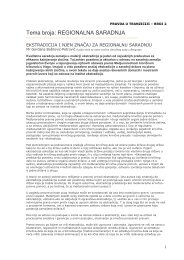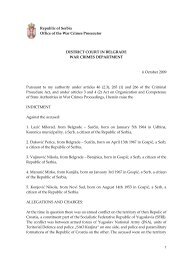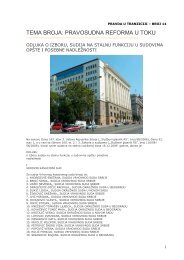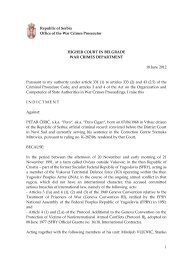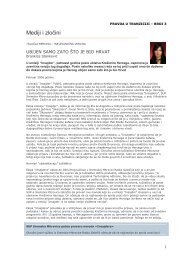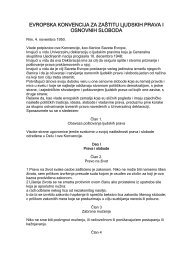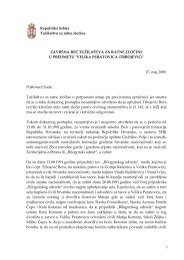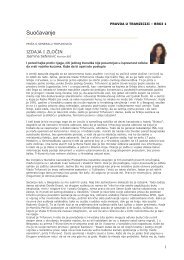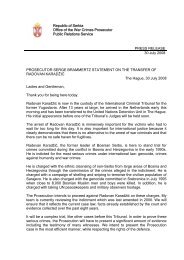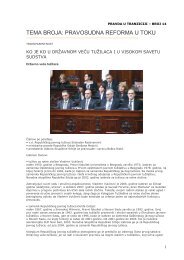Republic of Serbia Office of the War Crimes Prosecutor CLOSING ...
Republic of Serbia Office of the War Crimes Prosecutor CLOSING ...
Republic of Serbia Office of the War Crimes Prosecutor CLOSING ...
- No tags were found...
Create successful ePaper yourself
Turn your PDF publications into a flip-book with our unique Google optimized e-Paper software.
<strong>Republic</strong> <strong>of</strong> <strong>Serbia</strong><strong>Office</strong> <strong>of</strong> <strong>the</strong> <strong>War</strong> <strong>Crimes</strong> <strong>Prosecutor</strong><strong>CLOSING</strong> ARGUMENTS OF THE WAR CRIMES PROSECUTORIN THE “OVČARA 1 (VUJOVIĆ AND OTHERS)“ CASE15 October 2008<strong>CLOSING</strong> ARGUMENTS IIHonourable Court,The prosecution remains firm on <strong>the</strong> charges <strong>of</strong> <strong>the</strong> indictment against MiloradPEJIĆ, <strong>of</strong> <strong>the</strong> amended indictment against Saša RADAK (12 January 2006), and <strong>of</strong> <strong>the</strong>amended indictment against <strong>the</strong> accused: Miroljub VUJOVIĆ, Stanko VUJANOVIĆ,Jovica PERIĆ, Ivan ANASTASIJEVIĆ, Predrag MADŽARAC, Milan VOJNOVIĆ,Milan LANČUŽANIN, Marko LJUBOJA, Predrag MILOJEVIĆ, Predrag DRAGOVIĆ,Vujo ZLATAR, Goran MUGOŠA, Đorđe ŠOŠIĆ, Miroslav ĐANKOVIĆ, SlobodanKATIĆ and Nada KALABA (16 September 2005, i.e. 24 November 2005). I hold that<strong>the</strong> conducted evidentiary procedure fully corroborates <strong>the</strong> fact that <strong>the</strong> foregoingaccused individuals committed <strong>the</strong> criminal <strong>of</strong>fence as charged. Since <strong>the</strong>ir criminalresponsibility has been placed beyond doubt, I suggest that <strong>the</strong>y be pronouncedguilty and duly punished.Since <strong>the</strong> conclusions and assessments <strong>of</strong> <strong>the</strong> established facts, as given in <strong>the</strong><strong>Prosecutor</strong>’s closing arguments <strong>of</strong> 25 November 2005, i.e. 6 July 2006, have at nopoint been placed under doubt throughout <strong>the</strong> repeated proceedings, <strong>the</strong> said closingarguments will be included in this closing statement as its constituent parts. In view<strong>of</strong> <strong>the</strong> fact that <strong>the</strong> previous closing arguments are known to all <strong>of</strong> <strong>the</strong> participants in<strong>the</strong>se proceedings, and that <strong>the</strong>y are also included in <strong>the</strong> case files, I am not going torepeat <strong>the</strong>m on this occasion.In this closing argument, emphasis will be placed on evidence presented in <strong>the</strong>course <strong>of</strong> <strong>the</strong> repeated proceedings, primarily in <strong>the</strong> light <strong>of</strong> <strong>the</strong> Supreme Court’sorders contained in its annulments <strong>of</strong> 18 October 2006 and 29 March 2007.Specifically, pursuant to <strong>the</strong> aforementioned annulment rulings rendered by <strong>the</strong>second-instance court, <strong>the</strong> first-instance verdicts were revoked both in <strong>the</strong> principalcase and in that against Saša RADAK (<strong>the</strong> two are now being conducted jointly).1
Consequently, <strong>the</strong> cases were remanded for reconsideration to <strong>the</strong> first-instancecourt, which was also instructed – so as to enable thorough and correct establishment<strong>of</strong> <strong>the</strong> facts – to hear a number <strong>of</strong> witnesses, namely <strong>the</strong> following:- Milan Veljković, attorney-at-law, about whe<strong>the</strong>r he had been present during <strong>the</strong>interrogation <strong>of</strong> Jovica PERIĆ, conducted in <strong>the</strong> Belgrade <strong>of</strong>fice <strong>of</strong> UBPOK (Directionfor Fighting Organized Crime) on 18 April 2003, and whe<strong>the</strong>r he had ever had aconversation with PERIĆ indicating that <strong>the</strong> said accused person had any knowledge<strong>of</strong> his <strong>of</strong>ficial defence counsel; fur<strong>the</strong>rmore, <strong>the</strong> lower court was instructed, should itdeem appropriate, to bring <strong>the</strong> two face-to-face in order to assess <strong>the</strong> validity <strong>of</strong> <strong>the</strong>record on this accused’s interrogation conducted on <strong>the</strong> said occasion;- Mišel Husnik (bro<strong>the</strong>r <strong>of</strong> <strong>the</strong> accused Ivan ANASTASIJEVIĆ, at <strong>the</strong> time namedIvica HUSNIK), relating to this accused’s movement from his home to Veleprometand Ovčara; namely, <strong>the</strong> time <strong>of</strong> his stay at Ovčara, i.e. Grabovo, is relevant to <strong>the</strong>determination <strong>of</strong> whe<strong>the</strong>r he had killed only one captive (if it is true that he arrivedat <strong>the</strong> scene late that evening, as he maintains in his defence allegations), or he hadspent <strong>the</strong> whole day at Ovčara (as maintained by witness collaborator no. 2);- Nikola Dukić, relating to <strong>the</strong> events at Ovčara and Grabovo, whereafter, upon adetailed assessment <strong>of</strong> all statements previously made by this witness, <strong>the</strong> lowercourt should <strong>of</strong>fer valid reasons and relevant evidence in support <strong>of</strong> its claim that <strong>the</strong>accused Predrag MADŽARAC had engaged in <strong>the</strong> shooting and killing <strong>of</strong> <strong>the</strong>captives;- Lidija Nikolić (daughter <strong>of</strong> <strong>the</strong> accused Đorđe ŠOŠIĆ), relating to whe<strong>the</strong>r she hadbeen celebrating her birthday on 20 November 1991, and if so, whe<strong>the</strong>r this accusedindividual had been present at <strong>the</strong> party; and Ivica Andrić, relating to whe<strong>the</strong>r hehad left Vukovar on 19 November 1991 in <strong>the</strong> company <strong>of</strong> Đorđe ŠOŠIĆ, whereafter<strong>the</strong> court would be able to assess possible criminal responsibility <strong>of</strong> this accused;- Ivica Vuletić, relating to <strong>the</strong> events in <strong>the</strong> Vukovar hospital, at Ovčara and Grabovothroughout November 1991, in <strong>the</strong> light <strong>of</strong> <strong>the</strong> verdict rendered by <strong>the</strong> VukovarDistrict Court, whereby this individual had been convicted for <strong>the</strong> same event;Vuletić’s testimony might facilitate <strong>the</strong> clarification <strong>of</strong> a whole range <strong>of</strong> open issues;Mile Mrkšić (and, if necessary, Veselin Šljivančanin), relating to <strong>the</strong> existence <strong>of</strong> anywritten or oral order whereby Miroljub VUJOVIĆ and Stanko VUJANOVIĆ had beenappointed as respective commander and deputy commander <strong>of</strong> <strong>the</strong> VukovarTerritorial Defence (TO), and if so, whe<strong>the</strong>r such an order had been issued before orafter 20 November 1991; <strong>the</strong> court would thus avail itself <strong>of</strong> valid reasons behind<strong>the</strong>se crucial facts, since in <strong>the</strong>ir defence cases both accused deny <strong>the</strong> capacities <strong>the</strong>yare charged with.2
Fur<strong>the</strong>rmore, <strong>the</strong> second-instance court insisted that <strong>the</strong> new trial chamber shouldmake effort to obtain from <strong>the</strong> military authorities <strong>the</strong> written order mentioned bywitness Darko Fot in relation to <strong>the</strong> aforementioned shift within <strong>the</strong> Vukovar TOleadership.Additionally, <strong>the</strong> first-instance court was instructed to consider <strong>the</strong> defence counsel’sproposal fur<strong>the</strong>r to which <strong>the</strong> previously separated statement <strong>of</strong> 1 August 2003,provided during <strong>the</strong> investigative proceedings by witness collaborator no. 1, shouldbe rejoined to <strong>the</strong> case files.Pursuant to <strong>the</strong> Supreme Court’s instructions, a team <strong>of</strong> psychologists and pedagogyexperts carried out <strong>the</strong> examination <strong>of</strong> witness collaborator no. 1 in order to assess hisemotional maturity in <strong>the</strong> context <strong>of</strong> his age, and accordingly, his abilities to observe,memorize and provide a reliable account <strong>of</strong> such events after a considerable lapse <strong>of</strong>time.In addition to <strong>the</strong> above, <strong>the</strong> Supreme Court deemed it necessary that <strong>the</strong> firstinstancecourt obtain a forensic council opinion about <strong>the</strong> ability <strong>of</strong> <strong>the</strong> accused VujoZLATAR to move at <strong>the</strong> time <strong>of</strong> <strong>the</strong> Ovčara event – i.e. whe<strong>the</strong>r he had been able touse transport and make long journeys, whe<strong>the</strong>r he had been able to move with orwithout ano<strong>the</strong>r person’s assistance, and whe<strong>the</strong>r he would have been able to spendsome time standing unsupported in a firing platoon and shooting.The second-instance decision fur<strong>the</strong>r specified that <strong>the</strong> court would judge all <strong>of</strong> <strong>the</strong>foregoing evidence in <strong>the</strong> light <strong>of</strong> o<strong>the</strong>r evidence available, duly assess <strong>the</strong> accused’sdefence allegations and both witness collaborators’ testimonies, and provide validreasons in respect <strong>of</strong> <strong>the</strong> determining facts, which are all necessary prerequisites for acorrect and lawful decision.Acting upon <strong>the</strong> Supreme Court’s instructions, <strong>the</strong> first-instance court heard Mr.Milan Veljković, attorney-at-law, at its session <strong>of</strong> 14 March 2007. According to thiswitness’ testimony, on 18 April 2003, he was summoned to <strong>the</strong> UBPOK premises inBelgrade in order to attend – in his capacity as <strong>of</strong>ficial defence counsel – <strong>the</strong> hearing<strong>of</strong> arrested suspect Jovica Perić. On his arrival, Mr. Veljković had a confidential talkwith <strong>the</strong> suspect, introduced himself as a lawyer and presented him with hisbusiness card. The suspect, who was <strong>the</strong>n duly warned <strong>of</strong> his procedural rights,decided to present his defence ra<strong>the</strong>r than defend himself by silence. Theinterrogation was conducted in a fair manner, and whatever <strong>the</strong> suspect stated wasduly recorded. In subsequence, <strong>the</strong> suspect read through <strong>the</strong> record and, having noobjections to its contents, confirmed its au<strong>the</strong>nticity by his signature. This witnessfur<strong>the</strong>r claims that he was present throughout <strong>the</strong> whole course <strong>of</strong> <strong>the</strong> suspect’sinterrogation. Ultimately, he read <strong>the</strong> record himself and signed it, and so did <strong>the</strong>deputy prosecutor in charge, who was also present all <strong>the</strong> time during <strong>the</strong>3
interrogation. Likewise, when brought face to face, <strong>the</strong> suspect and <strong>the</strong> witnessremained firm in <strong>the</strong>ir respective statements.In <strong>the</strong> light <strong>of</strong> such a state <strong>of</strong> matters, it is perfectly clear that <strong>the</strong>re is no dilemmaabout <strong>the</strong> validity <strong>of</strong> <strong>the</strong> record at issue.As for Mišel Husnik, he could not be heard by <strong>the</strong> trial chamber since he is servinghis prison term in Croatia. In response to a letter rogatory to <strong>the</strong> Croatian authorities,this witness was interrogated through international legal assistance on 26 September2007, by an investigative judge <strong>of</strong> <strong>the</strong> District Court in Osijek. On that occasion <strong>the</strong>witness claimed that he was not aware <strong>of</strong> any activities that his bro<strong>the</strong>r, IvanANASTASIJEVIĆ, might have undertaken on <strong>the</strong> critical day. Specifically, <strong>the</strong>witness said that he did not know when his bro<strong>the</strong>r had left home and gone to <strong>the</strong>Velepromet company, or whe<strong>the</strong>r he had gone to Ovčara. The witness rememberedseeing his bro<strong>the</strong>r in <strong>the</strong> barracks that morning, when he had saved him from <strong>the</strong>bus, removed him, along with two o<strong>the</strong>r captives, from Velepromet and taken <strong>the</strong>mto ano<strong>the</strong>r building. However, <strong>the</strong> witness had no knowledge <strong>of</strong> his bro<strong>the</strong>r’s fur<strong>the</strong>rmovements in <strong>the</strong> remaining course <strong>of</strong> <strong>the</strong> day.In view <strong>of</strong> <strong>the</strong> above, I hold that this witness failed to confirm <strong>the</strong> defence <strong>of</strong>fered byIvan ANASTASIJEVIĆ at <strong>the</strong> trial session <strong>of</strong> 15 November 2005, regarding hismovements on <strong>the</strong> said day.The first-instance court reexamined witness Nikola Dukić, who, at <strong>the</strong> session <strong>of</strong> 15March 2007, virtually reiterated his previously given statements, and confirmed <strong>the</strong>monce again in confrontation with <strong>the</strong> accused Predrag MADŽARAC.Since witness Mile Mrkšić – who is currently in <strong>the</strong> ICTY detention unit – informed<strong>the</strong> Court that he did not want to testify in this case, his interrogation was notpossible ei<strong>the</strong>r in relation to this case or o<strong>the</strong>rwise.Witness Veselin Šljivančanin could not be interrogated since he is not allowed to givestatements before o<strong>the</strong>r courts – including <strong>the</strong> Court in Belgrade – before his case hasbeen finally settled at <strong>the</strong> Hague.The hearing <strong>of</strong> witness Ivica Andrić was not possible ei<strong>the</strong>r, since he could not betraced, i.e. since he remains unavailable to <strong>the</strong> state authorities. According to <strong>the</strong> dataavailable, this witness (if at all alive) is living at an unknown address outside <strong>the</strong>country.At <strong>the</strong> Court’s trial session <strong>of</strong> 16 March 2007, witness Lidija Nikolić stated that sheremembered her fa<strong>the</strong>r, Đorđe ŠOŠIĆ, being present at <strong>the</strong> celebration <strong>of</strong> hereighteenth birthday on 20 November 1991, along with his fellow combatant Ivica4
Andrić a.k.a Đetić. This witness stated that she also knew a.k.a Chinese (i.e. PredragMILOJEVIĆ), and claimed that he had visited Kruševac in her fa<strong>the</strong>r’s company on16 November 1991, for <strong>the</strong> family celebration <strong>of</strong> <strong>the</strong>ir Saint Patron’s Day (St. George).The accused MILOJEVIĆ, however, denied those allegations and said that he had notvisited Kruševac on <strong>the</strong> date specified by <strong>the</strong> witness, but on ano<strong>the</strong>r occasionaround mid-1992, which was also corroborated by <strong>the</strong> accused Đorđe ŠOŠIĆ.In contrast to her eighteenth birthday celebration, which she remembered in detail,including <strong>the</strong> venue <strong>of</strong> <strong>the</strong> party, names <strong>of</strong> guests, etc., this witness could notremember any details <strong>of</strong> her previous or subsequent birthday celebrations, or names<strong>of</strong> any participants <strong>the</strong>re<strong>of</strong>. In <strong>the</strong> light <strong>of</strong> <strong>the</strong> foregoing, I hold that this witness’testimony was exclusively aimed at providing her fa<strong>the</strong>r with an alibi, that it lackedfactual background and should <strong>the</strong>refore be dismissed as false.In <strong>the</strong> course <strong>of</strong> <strong>the</strong> new proceedings, at <strong>the</strong> session <strong>of</strong> 22 November 2007, witnessIvica Vuletić stated that he had been sentenced in Croatia to 20 years imprisonment,for alleged involvement in <strong>the</strong> execution <strong>of</strong> around 1,000 people at Ovčara.According to this witness’ claims, he had been coerced into admitting <strong>the</strong> <strong>of</strong>fenceduring <strong>the</strong> investigation, but had later denied it during <strong>the</strong> trial. He also maintainedthat he did not know anyone <strong>of</strong> <strong>the</strong> accused, that he had no idea who had committed<strong>the</strong> crime or where Ovčara was.It is evident that <strong>the</strong> statement provided by witness Ivica Vuletić could in no mannercontribute to <strong>the</strong> clarification <strong>of</strong> <strong>the</strong> event at issue. After all, he could not have beenexpected to admit before a <strong>Serbia</strong>n court <strong>the</strong> commission <strong>of</strong> <strong>the</strong> criminal act which hehad once denied in Croatia and thus assume responsibility for <strong>the</strong> said criminal eventwhile exculpating <strong>the</strong> individuals accused in <strong>the</strong>se proceedings.Pursuant to <strong>the</strong> Trial Chamber’s order, forensic tests were administered to witnesscollaborator No. 1 in relation to <strong>the</strong> circumstances specified in <strong>the</strong> annulment rulings.In <strong>the</strong>ir expert finding and opinion dated 26 July 2007 and reiterated at <strong>the</strong> trialsession <strong>of</strong> 5 September <strong>of</strong> <strong>the</strong> same year, Dr. Aleksandar Jovanović, phorensicpsychiatrist, and Dr. Nada Janković, phorensic psychologist, unanimouslyemphasize that witness collaborator No. 1 is a person <strong>of</strong> above average intellectualcapabilities and <strong>of</strong> a normally organized personality, with no tendency toconfabulation. The level <strong>of</strong> his mental development was consistent with his age inNovember 1991, when this person had a status <strong>of</strong> junior major. His ability toperceive, memorize and reproduce events over a fairly long lapse <strong>of</strong> time isconsistent with that <strong>of</strong> any sane person <strong>of</strong> his age. Fur<strong>the</strong>rmore, he does not sufferfrom any mental disease, deficiency or disorder, nei<strong>the</strong>r did he present any suchsymptoms in November 1991. Likewise, no symptoms <strong>of</strong> post-traumatic stressdisorder have been observed in <strong>the</strong> examinee, nor has he ever been treated for suchcomplaints. The forensic experts point out that <strong>the</strong> examinee was a member <strong>of</strong> an5
elite Guards unit, which recruited persons <strong>of</strong> tough and resilient psychophysicalconstitution, whose capability to manage stressful situations is superior to that <strong>of</strong>ordinary people. According to <strong>the</strong> forensic experts, during his participation in <strong>the</strong>captives’ executions (provided that <strong>the</strong> Court accepts his claims), his consciousnesswas not excluded or significantly narrowed. He was tense and certainly in a state <strong>of</strong>affect, which, however, was not <strong>of</strong> pathological nature. Referring to <strong>the</strong> accused’squestions and his defence allegations, <strong>the</strong> forensic experts remark that <strong>the</strong>examination <strong>of</strong> witness collaborator No. 1 would have certainly shown hisinclination to compulsive killing or pathological lying if <strong>the</strong>re had been any suchsigns, which here obviously was not <strong>the</strong> case.The foregoing reasoning, i.e. <strong>the</strong> forensic experts’ finding and opinion do not leaveany doubts as to this witness collaborator’s psychological pr<strong>of</strong>ile, <strong>the</strong> level <strong>of</strong> hisemotional development, intellectual abilities or any o<strong>the</strong>r o<strong>the</strong>r feature that mightcompromise his statement.Pursuant to <strong>the</strong> first-instance court’s order <strong>of</strong> 11 January 2007, <strong>the</strong> Forensic MedicalCommittee <strong>of</strong> <strong>the</strong> Belgrade Medical Faculty was assigned to conduct a forensicexamination <strong>of</strong> <strong>the</strong> accused, Vujo ZLATAR, relating to specified circumstances. Theexamination was performed by a medical team consisting <strong>of</strong> <strong>the</strong> following forensicexperts: a general surgeon; a neurosurgeon; a neuropsychiatrist; a chiropodist; aurologist; and two specialists in forensic medicine, whereas <strong>the</strong> Committeerepresentative at <strong>the</strong> trial <strong>of</strong> 5 September 2007 was Dr. Đorđe Alimpijević, specialistin forensic medicine. It was concluded that in <strong>the</strong> period between 18 and 21November 1991, Vujo ZLATAR had been able to move without <strong>the</strong> aid <strong>of</strong> a crutch.As it is fuzr<strong>the</strong>r claimed in <strong>the</strong> forensic report, any pains that ZLATAR might haveexperienced were so slight that <strong>the</strong>y could not have interfered with his ability towalk. Vujo ZLATAR was certainly able to move at <strong>the</strong> time <strong>of</strong> <strong>the</strong> event, and<strong>the</strong>refore had no need <strong>of</strong> o<strong>the</strong>r people’s assistance. In o<strong>the</strong>r words, this accused couldhave moved unassisted at <strong>the</strong> time <strong>of</strong> <strong>the</strong> crime commission, although he might havebeen lame (in <strong>the</strong> left leg) and <strong>the</strong>refore walked with difficulty. Concurrently, hisability to stand or remain in an upright position with his body leaning against solidground was by no means compromised. In <strong>the</strong> light <strong>of</strong> <strong>the</strong> foregoing, <strong>the</strong> accusedwould have been able to board means <strong>of</strong> transport and travel undisturbed over shortor long distances.Referring to <strong>the</strong> forensic expert report provided by Dr. Jančić in <strong>the</strong> course <strong>of</strong> <strong>the</strong>previous trial, <strong>the</strong> forensic committee experts argue that it was not substantiated byrelevant medical documentation, whereas <strong>the</strong>irs is exclusively based on availablemedical documentation.The analysis <strong>of</strong> <strong>the</strong> above circumstances leads to <strong>the</strong> unambiguous conclusion that nosingle circumstance leaves any doubts as to Vujo ZLATAR’s capability <strong>of</strong> movement6
tempore criminis, which implicitly corroborates <strong>the</strong> relevant statement provided bywitness collaborator No. 1.The first-instance court also addressed <strong>the</strong> military authorities requesting <strong>the</strong> writtenorder appointing <strong>the</strong> accused Miroljub VUJOVIĆ and Stanko VUJANOVIĆ to <strong>the</strong>respective positions <strong>of</strong> TO Vukovar commander and deputy commander, but itreceived <strong>the</strong> reply that <strong>the</strong>y were not in <strong>the</strong> possession <strong>of</strong> any such document.Seeking to resolve this issue, <strong>the</strong> first-instance court heard witness Radoje Trifunovićat <strong>the</strong> trial session <strong>of</strong> 16 March 2007. This witness claimed that, in his capacity as JNAguards brigade <strong>of</strong>ficer, he had kept a war log during <strong>the</strong> hostilities in Vukovar. Heremembered <strong>the</strong> shift in <strong>the</strong> TO leadership, when, pursuant to <strong>the</strong> order issued byMile Mrkšić, commander <strong>of</strong> <strong>the</strong> operational zone “South“, Duško Jakšić, <strong>the</strong> <strong>the</strong>n-farcommander, had been replaced by <strong>the</strong> accused Miroljub VUJOVIĆ, whereas <strong>the</strong>accused Stanko VUJANOVIĆ had been appointed as his deputy. According to thiswitness’ allegations, he had personally written that order on 20 November 1991, ataround noon or in <strong>the</strong> afternoon. The order had <strong>the</strong>n been signed by commanderMrkšić, but <strong>the</strong> witness could not remember whe<strong>the</strong>r it had happened that sameevening or <strong>the</strong> following morning. In subsequence, <strong>the</strong> witness had not managed t<strong>of</strong>ind <strong>the</strong> said order anywhere, and <strong>the</strong>refore it had remained unregistered in <strong>the</strong>brigade’s logbook.Still, <strong>the</strong>re is ano<strong>the</strong>r detail in this witness’ statement which might be helpful in <strong>the</strong>clarification <strong>of</strong> this issue. Namely, <strong>the</strong> witness claims that three or four daysfollowing his arrival in Vukovar, he was appointed operational chief instead <strong>of</strong> MajorLukić, who was <strong>the</strong>n appointed commander <strong>of</strong> <strong>the</strong> 2nd Pursuit Detachment. The shiftwas carried out upon an orally issued order <strong>of</strong> Mile Mrkšić, which had a momentaryeffect. The witness explains that, according to <strong>the</strong> rules <strong>of</strong> service, an order <strong>of</strong> such arank should first have been made in writing, presented to commander Mrkšić forsigning and <strong>the</strong>n delivered to Trifunović, whereupon it would eventually have comeinto effect. However, <strong>the</strong>re was a war, and things work differently at such times.Thus, <strong>the</strong> witness had never received a written version <strong>of</strong> <strong>the</strong> said order, and yetacted as though he had.In <strong>the</strong> light <strong>of</strong> <strong>the</strong> above described practices, it is easy to assume that it was not laterthan in <strong>the</strong> afternoon <strong>of</strong> 20 November 1991, and certainly before <strong>the</strong> Ovčara events,that <strong>the</strong> said shift within <strong>the</strong> Vukovar TO leadership took place, i.e. that at Ovčara, at<strong>the</strong> time <strong>of</strong> <strong>the</strong> crimes commission, <strong>the</strong> Vukovar TO commander was MiroljubVUJOVIĆ, whereas Stanko VUJANOVIĆ was his deputy, fur<strong>the</strong>r to <strong>the</strong> spoken orderthat <strong>the</strong> two had previously received.Such a conclusion is also substantiated by <strong>the</strong> statement provided by witness MilanMilanović, at <strong>the</strong> trial session <strong>of</strong> 18 December 2007. This witness implicitly claims7
that at <strong>the</strong> time <strong>of</strong> <strong>the</strong> Ovčara events Vukovar TO commander was MiroljubVUJOVIĆ, which could be observed in Belgrade, during a reception given by GeneralKadijević, <strong>the</strong> Federal Secretary for National Defence. On that occasion, MiroljubVUJOVIĆ was introduced in his commander capacity, whereas Dušan Jakšić was notpresent at <strong>the</strong> event.In his statement given within <strong>the</strong> trial session <strong>of</strong> 19 December 2007, witness MiroslavRadić claims that shortly ahead <strong>of</strong> <strong>the</strong> cessation <strong>of</strong> <strong>the</strong> hostilities in Vukovar, <strong>the</strong>accused, VUJOVIĆ, was known to be Jakšić’s successor at <strong>the</strong> head <strong>of</strong> <strong>the</strong> VukovarTO, yet this witness has no knowledge as to who had appointed <strong>the</strong> newcommander.Likewise, at <strong>the</strong> trial sessions <strong>of</strong> 21 and 22 January 2008, witness Bojković (earlierBojkovski) testifies that he was aware <strong>of</strong> <strong>the</strong> shift at <strong>the</strong> head <strong>of</strong> <strong>the</strong> Vukovar TO, and<strong>of</strong> VUJOVIĆ’s appointment as commander shortly before <strong>the</strong> cessation <strong>of</strong> <strong>the</strong>hostilities. The witness was additionally assured <strong>of</strong> this fact during an oral reportsubmitted to Major Tešić, when a new uniform was demanded for VUJOVIĆ ahead<strong>of</strong> his trip to Belgrade in order to attend Gen. Kadijević’s reception.The above allegations coincide with those heard at <strong>the</strong> trial session <strong>of</strong> 19 June 2007,when witness Jakšić testified about his removal from <strong>the</strong> TO command position andVUJOVIĆ’s appointment <strong>the</strong>reto, shortly before <strong>the</strong> fights ended.The conclusion that <strong>the</strong> accused, VUJOVIĆ and VUJANOVIĆ, held <strong>the</strong> respectivepositions <strong>of</strong> Vukovar TO commander and deputy commander at <strong>the</strong> time <strong>of</strong> <strong>the</strong>Ovčara events is additionally corroborated by <strong>the</strong> ICTY verdict against <strong>the</strong> “Vukovartroika“, which has been included in <strong>the</strong> court files and which refers to <strong>the</strong> transcripts<strong>of</strong> <strong>the</strong> ICTY trial.In compliance with <strong>the</strong> defence proposals, <strong>the</strong> court has rejoined to <strong>the</strong> case files <strong>the</strong>previously excluded witness statements provided in <strong>the</strong> course <strong>of</strong> investigation,namely those <strong>of</strong> witnesses collaborators 1 and 2 (dated 1 August 2003 and 25 June2003 respectively), who at <strong>the</strong> time testified in regular witness capacity.The Medical Faculty in Zagreb has <strong>of</strong>ficially reported that <strong>the</strong> identity <strong>of</strong> yet ano<strong>the</strong>rvictim exhumed from <strong>the</strong> Ovčara massgrave has been established in <strong>the</strong> meantime.Thus, with <strong>the</strong> newly identified victim (Goran Jularić), <strong>the</strong> number <strong>of</strong> those identifiedso far has amounted to a total <strong>of</strong> 193.In order to establish <strong>the</strong> au<strong>the</strong>nticity <strong>of</strong> defence allegations provided by <strong>the</strong> accused:Predrag MILOJEVIĆ, Milan LANČUŽANIN and Predrag DRAGOVIĆ – who claimthat in <strong>the</strong> evening and night <strong>of</strong> <strong>the</strong> Ovčara events, <strong>the</strong>y were staying in <strong>the</strong> home <strong>of</strong>a local named Radojka Vučković, where, accompanied by Captain Miroslav Radić,8
<strong>the</strong>y were having dinner – <strong>the</strong> court summoned Ms. Radojka Vučković to give hertestimony. Since Ms. Vučković refused to respond, <strong>the</strong> court obtained her statementby means <strong>of</strong> international legal assistance. On 14 May 2008, testifying before aninvestigative judge <strong>of</strong> <strong>the</strong> Vukovar District Court, witness Vučković denied <strong>the</strong>foregoing defence allegations. She pointed out that in her home <strong>the</strong>re had been adinner party attended by a.k.a. Chinese, a.k.a. Ceca and a.k.a. Belgija (i.e. <strong>the</strong>accused: MILOJEVIĆ and DRAGOVIĆ, and witness Stojisavljević); however, <strong>the</strong>witness maintained that <strong>the</strong> dinner had taken place in October, when <strong>the</strong> wea<strong>the</strong>rwas still warm and intensity <strong>of</strong> fights low, ra<strong>the</strong>r than in late November. As forCaptain Radić, <strong>the</strong> witness specified that he had not been present at <strong>the</strong> said dinnerparty, nor had he visited her place on any o<strong>the</strong>r occasion.Likewise, in his aforementioned statement <strong>of</strong> 19 December 2007, witness Radićdenied being at Ms. Vučković’s place with <strong>the</strong> foregoing accused individuals, andspecified that he had spent <strong>the</strong> critical evening in <strong>the</strong> home <strong>of</strong> Guards BrigadeLieutenant Davor Vučković, at a dinner which had been exclusively attended by<strong>of</strong>ficers. Radić’s allegations were also confirmed by Lt. Davor Vučković, who testifiedat <strong>the</strong> trial session <strong>of</strong> 17 March 2008.In <strong>the</strong> light <strong>of</strong> <strong>the</strong> above, it is evident that <strong>the</strong> defence allegations <strong>of</strong> <strong>the</strong> accused:MILOJEVIĆ, DRAGOVIĆ and LANČUŽANIN relating to <strong>the</strong>ir whereabouts on <strong>the</strong>critical night are false and should <strong>the</strong>refore be dismissed.A video-clip obtained from <strong>the</strong> Hague (ICTY doc. No. P288), which was presented at<strong>the</strong> trial session <strong>of</strong> 18 June 2008, features <strong>the</strong> accused, Milan LANČUŽANIN, in <strong>the</strong>company <strong>of</strong> Predrag DRAGOVIĆ in Vukovar, on 20 November 1991 at 15:13 hrs. Therecording clearly contradicts <strong>the</strong> defence allegations <strong>of</strong>fered by <strong>the</strong> accused, MilanLANČUŽANIN, who claims that at <strong>the</strong> time he was in Belgrade, visiting a woundedfellow-combatant, and that he had not returned to Vukovar until late that night.According to <strong>the</strong> defence allegations <strong>of</strong>fered by <strong>the</strong> accused, Nada KALABA, herformer superior at <strong>the</strong> Nama department store in Vukovar, where she had beenemployed before <strong>the</strong> war, was Martin Sabljak, and not Josip Batarelo, who wasallegedly killed at Ovčara on <strong>the</strong> critical night. By way <strong>of</strong> international legalassistance, <strong>the</strong> court has obtained a report from Nama, a joint-stock company inbankruptcy proceedings, specifying that <strong>the</strong> accused, Nada KALABA, had beenemployed with <strong>the</strong> said trading company in Vukovar up to 16 July 1991, when heremployment contract was terminated against her will. Concurrently, Josip Batarelohad worked in <strong>the</strong> said department store as an assistant director, whereas MartinSabljak had not been employed <strong>the</strong>re at <strong>the</strong> time.Linked with <strong>the</strong> statements <strong>of</strong>fered by witness collaborators 1 and 2, <strong>the</strong> foregoingfacts unambiguously suggest that Josip Batarelo might have been <strong>the</strong> person whom9
<strong>the</strong> accused, Nada KALABA, killed at Ovčara, <strong>the</strong>reby taking her revenge for beingdismissed from work.Presenting his defence during <strong>the</strong> proceedings, <strong>the</strong> accused, Vujo ZLATAR, claimsthat it was not easy to get in or outside Vukovar during <strong>the</strong> war. There werecheckpoints and special entry/exit permits were issued by relevant authorities.ZLATAR fur<strong>the</strong>r alleges that at <strong>the</strong> time he was receiving a medical treatment in<strong>Serbia</strong> and, since nei<strong>the</strong>r his entry into Vukovar nor his exit <strong>the</strong>re<strong>of</strong> were registeredat <strong>the</strong> checkpoints, he concludes that he clearly could not have been in Vukovar.However, his statement is in flat contradiction with those given by witnesses Đukićand Stojisavljević. Thus, in his statement provded at <strong>the</strong> trial session <strong>of</strong> 21 April 2008,witness Dragoljub Đukić claims that, on his return from Vukovar, where he wasaccompanying Cyrus Vance, he did not notice any checkpoints whatsoever. On <strong>the</strong>o<strong>the</strong>r hand, in his statement provided at <strong>the</strong> trial session <strong>of</strong> 19 June 2008, witnessNedeljko Stojisavljević testifies that, on his departure from Vukovar on 20 November1991, he did not need a permit or any similar document, since <strong>the</strong> site was notcontrolled by anyone.In view <strong>of</strong> <strong>the</strong> above, it is clear that anyone could get into or out <strong>of</strong> Vukovar at <strong>the</strong>time, or in o<strong>the</strong>r words, that <strong>the</strong> whole area was outside control. Moreover, with afrontline so long as that in <strong>the</strong> Vukovar area, one could hardly assume that anycontrol would have been possible in <strong>the</strong> first place. Consequently, <strong>the</strong> accused, VujoZLATAR, was certainly able to get into or out <strong>of</strong> Vukovar unregistered andaccordingly, he may have reached Ovčara and Grabovo in <strong>the</strong> above describedmanner.What must be mentioned in this closing statement is also <strong>the</strong> testimony given bywitness Miroslav Savić, at <strong>the</strong> trial session <strong>of</strong> 15 September 2008. This witness fur<strong>the</strong>rcorroborates <strong>the</strong> indictment allegations, as well as <strong>the</strong> credibility <strong>of</strong> <strong>the</strong> two witnesscollaborators.Namely, this witness claims that he was present at Ovčara on <strong>the</strong> critical day, onwhich occasion he saw <strong>the</strong> accused, ANASTASIJEVIĆ, both outside and inside <strong>the</strong>hangar building; yet, <strong>the</strong> witness specifies that this situation occurred far ahead <strong>of</strong><strong>the</strong> time specified by ANASTASIJEVIĆ himself as <strong>the</strong> moment <strong>of</strong> his arrival at <strong>the</strong>site. In contrast to <strong>the</strong> defence allegations provided by <strong>the</strong> accused, Saša RADAK,witness Savić testifies that he freely entered into <strong>the</strong> hangar, like anyone else coulddo. Once inside, <strong>the</strong> witness saw RADAK, VUJANOVIĆ and Saša Ivanković, as wellas three captives (Kožul, Vulić and Pap). The witness goes on to say that heapproached VUJANOVIĆ and asked him for permission to take out four captivesspecifying <strong>the</strong>ir names. VUJANOVIĆ replied that noone was allowed to leave <strong>the</strong>place. At a later point, Stevo Zorić a.k.a. Ćevo approached VUJANOVIĆ with asimilar request, which <strong>the</strong> latter did not deny. Witness Savić also points out that on10
<strong>the</strong> same occasion at Ovčara he saw <strong>the</strong> accused, Vujo ZLATAR, and gives a detailedaccount as to whom ZLATAR was talking to, what he was wearing and how he wasarmed. Presented with ZLATAR’s defence allegations and his medicaldocumentation on <strong>the</strong> part <strong>of</strong> <strong>the</strong> Presiding Judge, as well as with <strong>the</strong> testimonies <strong>of</strong>those who deny seeing ZLATAR at Ovčara, <strong>the</strong> witness has none<strong>the</strong>less remainedfirm in his original claims.It is evident that one could hardly have invented or remembered a story with such anamount <strong>of</strong> details unless one had been present at <strong>the</strong> scene and personally watched<strong>the</strong> developments.On <strong>the</strong> next day, i.e. at <strong>the</strong> trial session <strong>of</strong> 16 September 2008, witness Savić partlymodifies his statement saying that after a sleepless night he can no longer be sure ifhe really saw <strong>the</strong> accused, RADAK and ZLATAR, at Ovčara, which can be attributedto his belated wish to protect <strong>the</strong> two. While this lack <strong>of</strong> consistency is human and<strong>the</strong>refore understandable, it is certainly insignificant in terms <strong>of</strong> legal relevance.As for <strong>the</strong> accused, Milorad PEJIĆ, it should be noted that throughout <strong>the</strong>investigation he defended himself by silence, but decided to speak up at <strong>the</strong> trial.Thus, speaking at <strong>the</strong> trial session <strong>of</strong> 16 June 2008, PEJIĆ denies his involvement in<strong>the</strong> crime, and complains that he has been framed by witness Nikola Dukić a.k.a.Gidža. PEJIĆ goes on to explain that on <strong>the</strong> critical night at Ovčara, he saw Dukićbeating a group <strong>of</strong> captives inside <strong>the</strong> hangar. PEJIĆ fur<strong>the</strong>r claims that he saw Dukićremoving one <strong>of</strong> <strong>the</strong> captives (Damir Kovačić) from <strong>the</strong> group and shooting himdead outside <strong>the</strong> hangar. When PEJIĆ allegedly reproached Dukić for <strong>the</strong> describedact, <strong>the</strong> two engaged in an argument and have not spoken to each o<strong>the</strong>r ever since.This accused individual claims that, upon his return to village Negoslavci he toldDraženko Đokić that he had not been able to save Kovačić, since Dukić had killedhim at Ovčara. At <strong>the</strong> beginning <strong>of</strong> <strong>the</strong> current proceedings, PEJIĆ contacted Dukićand asked him why he was making accusations against him, and Dukić allegedlyanswered: “I am not accusing you, you don’t understand...“.Such defence allegations are in contradiction with <strong>the</strong> evidence presented and areobviously aimed at <strong>the</strong> evasion <strong>of</strong> criminal responsibility.On his part, witness Nikola Dukić states that <strong>the</strong> accused, Milorad PEJIĆ, waspresent at Grabovo on <strong>the</strong> critical night, where he was standing in <strong>the</strong> firing platoonand shooting at <strong>the</strong> captives who had been brought <strong>the</strong>re from Ovčara. In that way,PEJIĆ wanted to revenge his bro<strong>the</strong>r Miroslav Pejić a.k.a. Bimbo, who had beenkilled during <strong>the</strong> fights in Vukovar. It was only when legal proceedings had beencommenced against him that PEJIĆ telephoned Dukić to complain about <strong>the</strong> latter’saccusations. At a later point, PEJIĆ also contacted Dukić’s wife <strong>of</strong>fering her moneyand urging her to influence her husband to change his original statement. As for11
witness Dukić himself, he maintains that he has never had an argument with PEJIĆ.Likewise, in his statement <strong>of</strong> 16 September 2008, witness Draženko Đokić confirmsthat relations between Nikola Dukić and <strong>the</strong> accused, PEJIĆ, have always been goodand that <strong>the</strong> two are also distant relatives. Witness Đokić points out that, upon hisreturn to Negoslavci on <strong>the</strong> critical day, PEJIĆ only said that he had not been able todo anything for Damir Kovačić at Ovčara. As far as witness Đokić can recollectdetails <strong>of</strong> his conversation with PEJIĆ on <strong>the</strong> said day, this accused individual at nopoint said that Dukić had killed Kovačić. It was only at a later point that PEJIĆphoned Đokić from England – where he was residing at <strong>the</strong> time – and told him thatDukić had killed Kovačić. This phone conversation took place at <strong>the</strong> time whenproceedings against PEJIĆ had already been under way before <strong>the</strong> national court,parallelly with those conducted against him in Croatia, where he was also chargedwith killing Damir Kovačić at Ovčara. The timing <strong>of</strong> PEJIĆ’s phone call and itscoincidence with <strong>the</strong> court proceedings against him most probably explain <strong>the</strong>reasons behind <strong>the</strong> construction <strong>of</strong> his defence.This accused individual committed <strong>the</strong> described criminal act with directpremeditation, since he was aware <strong>of</strong> his act and willfully engaged <strong>the</strong>rein, whereashis self-possession remained unquestionable at all times.By acting in <strong>the</strong> above described manner, this accused individual committed seriousbreaches <strong>of</strong> international law, namely <strong>of</strong> <strong>the</strong> provisions contained in <strong>the</strong> followingdocuments:- Third Geneva Convention <strong>of</strong> 1949, which covers <strong>the</strong> treatment <strong>of</strong> war prisoners; and- Additional Protocol to <strong>the</strong> 1949 Geneva Conventions, <strong>of</strong> 1977, which covers <strong>the</strong>protection <strong>of</strong> victims <strong>of</strong> noninternational armed conflicts.In consideration <strong>of</strong> <strong>the</strong> fact that <strong>the</strong> acts described in <strong>the</strong> afforementioned Conventionand its Additional Protocol are, following <strong>the</strong> ratification <strong>of</strong> <strong>the</strong>se documents, alsoincriminated by our national laws, <strong>the</strong> accused, Milorad PEJIĆ, is criminallyresponsible for <strong>the</strong> commission <strong>of</strong> <strong>the</strong> criminal <strong>of</strong>fence recognized by article 144 (warcrime against prisoners <strong>of</strong> war) <strong>of</strong> <strong>the</strong> FRY Criminal Code, which falls into <strong>the</strong> group<strong>of</strong> criminal <strong>of</strong>fences against humanity and international law.Summing up <strong>the</strong> foregoing facts, I hold that <strong>the</strong> evidence presented at <strong>the</strong> new trialunambiguously indicates that <strong>the</strong> accused: Miroljub VUJOVIĆ, Stanko VUJANOVIĆ,Jovica PERIĆ, Ivan ANASTASIJEVIĆ, Predrag MADŽARAC, Milan VOJNOVIĆ,Milan LANČUŽANIN, Marko LJUBOJA, Predrag MILOJEVIĆ, Predrag DRAGOVIĆ,Vujo ZLATAR, Goran MUGOŠA, Đorđe ŠOŠIĆ, Miroslav ĐANKOVIĆ, SlobodanKATIĆ, Nada KALABA, Saša RADAK and Milorad PEJIĆ, committed <strong>the</strong> criminal12
<strong>of</strong>fence as charged by <strong>the</strong> indictments, and in <strong>the</strong> manner detailed <strong>the</strong>rein.Consequently, I suggest that <strong>the</strong>y be pronounced guilty and duly punished by thisCourt, whereas <strong>the</strong>ir individual levels <strong>of</strong> responsibility should be distinguished, i.e.distinction should be made among those who inflicted bodily harm on <strong>the</strong> captives,those who killed <strong>the</strong>m, those who engaged in both, those who ordered <strong>the</strong> criminalacts and those who personally participated in <strong>the</strong>ir commission, which is <strong>the</strong> keycriterion for <strong>the</strong> determination <strong>of</strong> individual punishments.Moreover, in view <strong>of</strong> <strong>the</strong> manner <strong>of</strong> <strong>the</strong> crime commission and, in particular, <strong>the</strong>gravity <strong>of</strong> <strong>the</strong> crime arising from <strong>the</strong> joint enterprise <strong>of</strong> <strong>the</strong> accused, and considering<strong>the</strong> large number <strong>of</strong> victims who were deprived <strong>of</strong> life on <strong>the</strong> critical occasion, it isneccesary and appropriate that all <strong>of</strong> <strong>the</strong> accused be placed under detention onremand pursuant to article 358 (5) re article 142 (1.2) <strong>of</strong> <strong>the</strong> Act on CriminalProcedure.WAR CRIMES PROSECUTORVladimir VukčevićDEPUTY WAR CRIMES PROSECUTORDušan Knežević13



